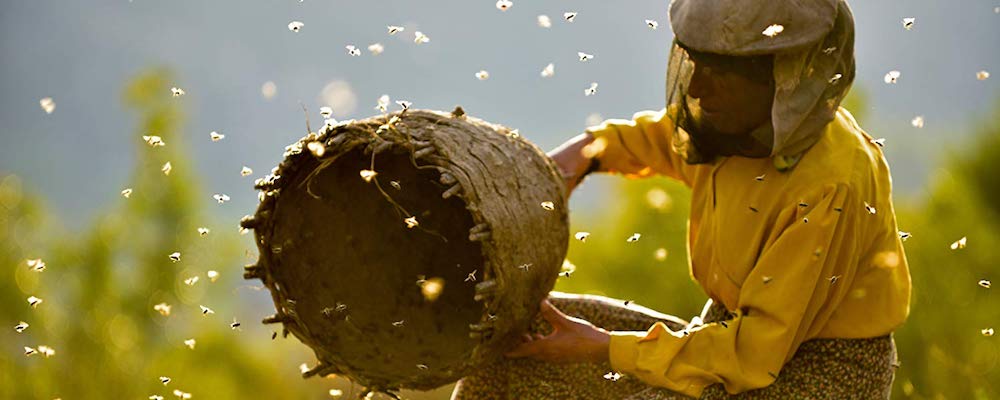‘Honeyland’ Is a Deeply Human Eco-Documentary on Macedonia’s Last Humble Beekeeper
Andrew Bundy
Reciprocity is key to life, especially when nurturing Mother Nature. Walking along the narrow edge of a jagged cliff in Macedonia, a woman named Hatidze visits a group of beehives, tucked away behind stone windows hidden along the mountainside. She removes the honeycomb from the hives behind the rocky plates but is careful to leave half the honey.
“Honeyland,” which was the documentary winner of the World Cinema Grand Jury Prize at this past Sundance Film Festival — is a beautifully contemplative piece on tradition and cultivation — a boldly cinematic poem that is worth respecting for its film grammar forward approach alone. But the film is also a humbling triumph of humanism. It almost feels more like realist third world cinema than it does a documentary. The filming approach transports the viewer to a completely different country, spinning sensory, composition driven dramaturgy out of a very specific ethnic ecosystem
Hatidze and her aging mother, Nazife are the last two humans remaining in their region of Macedonia. They are no roads where they live, and little to zero vegetation. But this land thrived long before people ever came here. The pair of women have found a purpose in caring for the queen bee, which never leaves its hive. Nazife has recently taken ill and Hatidze commits to caring for both matriarchs.
Even though her mother is losing sight and slowly becoming paralyzed, Hatidze is careful to never take more than she needs. Her mother taught her to always leave the hive half their honey, so the colony doesn’t die out. But when a family of nomads moves into the area, their hasty and indelicate approach threatens to upset the natural order of things. The father, Hussain, acts unmindful and inconsiderate, with his boys running around bored when not tending to the calves and other livestock. Some of the animals turn soon sickly and it’s also clear that Hussain’s family aren’t abiding by Hatzide’s beekeeping golden rule.
What’s fascinating about “Honeyland” is how specific and yet timeless the film feels. At its core, nature versus culture is the simple, central idea. Can the two live mutually, or must one always be parasitic? If we cannot coexist with what is around us, who are we to create rules for anyone? The style of the film also parallels its thematic approach, being paced like worldly slow cinema. The documentary almost feels reminiscent of a movie such as Abbas Kiarostami’s “Where is the Friend’s House?” at times. Co-director’s Ljubomir Stefanov and Tamara Kotevska’s storytelling approach arguably does the doc a disservice at the outset but results in a stirring emotional journey and a powerfully humbling final act.
“Honeyland” uses no talking heads or interviews, instead it opts for a kind of reflective narration that is juxtaposed against the visuals. There is very little dialog, even within the few intimate character scenes in the film. The imagery is absolutely striking and shot remarkably, but as the documentary is without traditional exposition it might take certain viewers some time to catch up the cultural behaviors, the movie’s tone and its story specifics. It plays more like a silent, art house nature film than it does a documentary narrative.
Given the conditions of the region, “Honeyland’s crew were only able to film the area for 5 days at a time. Eventually they accumulated over 400 hours of footage to use for the project. The editing of the film began during the shoot, due to how much material was being collected. Yet, the documentary still feels focused and compact, despite the daunting task of assembling order out of chaos. “Honeyland” manages to balance emotional and informative progression each at once, while opting to avoid using lazy storytelling techniques. Such disciplinary filmmaking results in a kind of organic cinema that is simply something to behold. “Honeyland” is so immersive you might forget the images before your eyes are not, in fact, being scripted.
“Honeyland” releases July 26 in select theaters.

